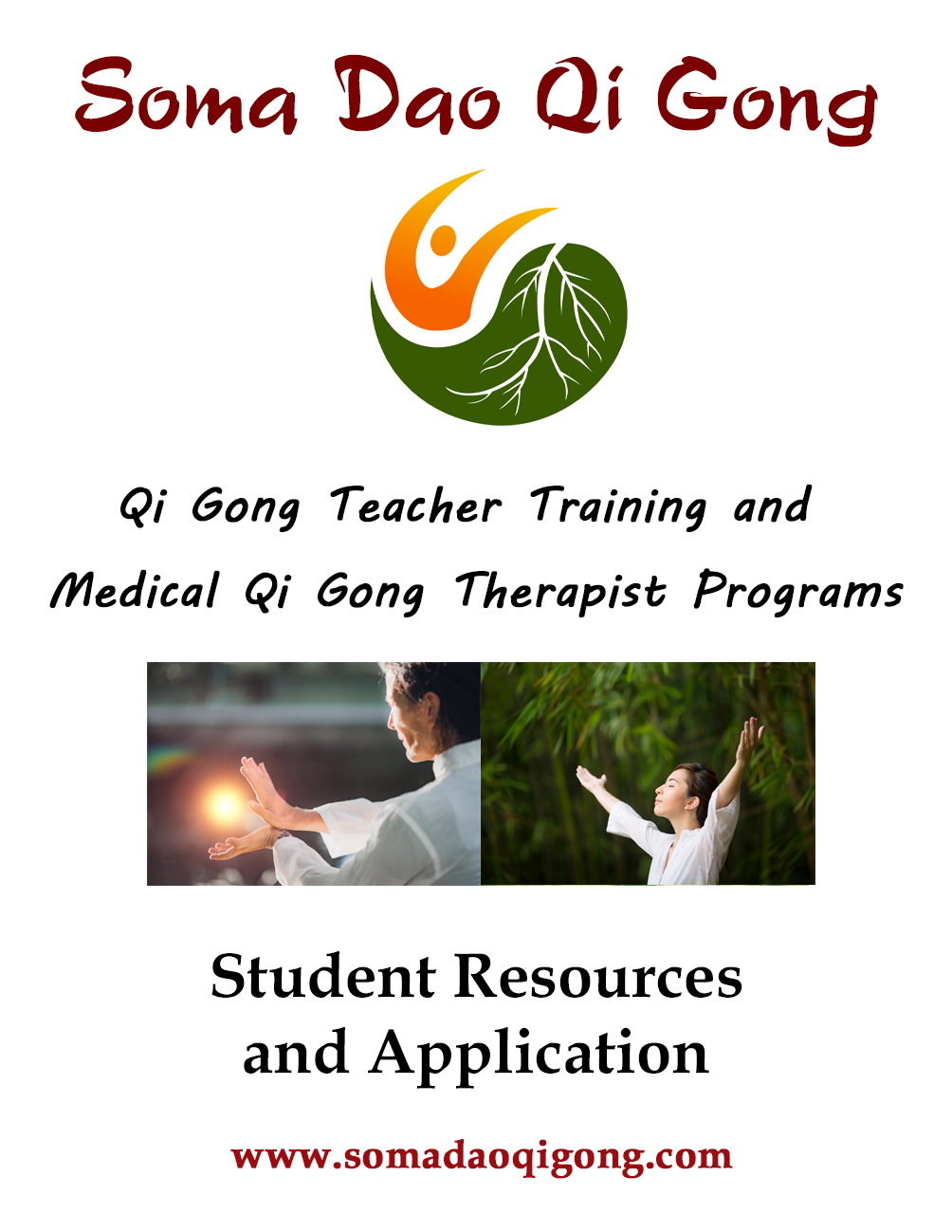
This article is for my Qi Gong Teacher Training students and anyone feeling like their vitality, self-care, and spiritual practices are becoming a chore.
Learning something new can be challenging.
Learning to teach can be terrifying!
Those challenges, feelings, and beliefs are the perfect soil for some deeply embodied Qi Gong practice and healing. Something tangible to let of.
The next time you begin a Qi Gong practice, take a few breaths and feel into the aspect of your practice that you think of as homework. Or, that part of you that ‘should’ practice.
If you are keeping up with the schedule of a Qi Gong Teacher Training course, or the schedule of every other aspect of your life, take a deep and slow breath and feel into any qualities of anticipation and expectation that you may find in your meridians and muscle memory.
Qi Gong is about self-care – use that tangle of narrative, emotion, and embodied state to come back into a conscious relationship with why you choose to practice Qi Gong or other forms of self-care.
Please, do not let your practice feel like homework.
The next time you begin your practice, take a few breaths and feel into your embodied sensations. Scan your body from your head to your toes.
Ting Jin, is your Inner Listening Ability. Ting Jin, or ‘feeling in’ is your gateway. Reach into your body and listen, almost like you are somewhere between listening with your ears and smelling with your nose and reaching with your finger towards a light switch in the dark – all at the same time.
Ting Jin a whole-body kind of inner sensing, feeling, listening, reaching, and touching.
Listening to Your Body is a Skill.
Try these simple self-awareness exercises:
- Get very still and breath slowly and deeply.
- Feel your mouth and tongue. Which side of your tongue feels thicker?
- Feel your feet. Which one feels stiffer?
- Feel your belly. Are you holding any unconscious tension?
- Feel into your liver. Does it have any requests?
- Feel your neck and shoulders. Move your head around. If you were getting a massage, where would you want some relief?
Listening to your body takes patience and the courage to feel what you are actually feeling. You are feeling that anyway, after all…
For the next ten, or ten thousand, Qi Gong practices, and/or a few times a day, have an intimate conversation with your body. Appreciate what you feel, trust your body and your sensations, what you are experiencing is a doorway to your authentic self – and much more!

Listen to Your Body
Next time you begin your Qi Gong practice – feel into your body. Listen and feel any part of you that is feeling impatience about anything, including:
- Your Qi Gong practice feels like homework.
- You have a lot of pressure in your life.
- You have expectations about performance.
- The social and economic changes of 2020.
- You find keeping up with a schedule challenging.
- You are concerned that other people may be disappointed with you in some way.
Just feel into those feelings. Impatience is about the future. Disappointment is just a disguise for expectation.
Come back to now…
Inhale and Ting Jin – feel into every corner of seriousness you can find. Imitate the sensations in your body and exaggerate them as a ‘cartoon’ gesture.
Exhale and Play. Feel into your body overdoing an unconscious habit and release your neck, shoulders diaphragm, and pelvis. Move (dance) like kelp in the ocean.
Keep breathing, imitating, releasing, and playing like that until you feel like a puddle.
This may be terrifying to think about, but we all feel those feelings most of the time. Modern life is unbelievably busy and profoundly distracting. If you are in any kind of online training, there are always goals and imagined finish lines – on top of 2020 and all of the other things you do with screens.
Goals and finish lines are things we invent, agree to, and obsess over because they can keep us motivated. That is modern conditioning. There are much more enjoyable ways to stay motivated.
Daoism is all about the weather
It is great to feel motivated, and commitments matter, but what actually happens is just the weather. Climates and seasons create a sense of expectation – and then there is the weather. Daoism surfs the waves of Chaos and Order, or, metaphorically, climate and weather.
Pay attention to your feeling of motivation to learn – that is actually happening right now. Those schedules and finish lines, however, live in that fluid place called the future.
Next time you begin your Qi Gong practice – feel into your body. Listen and feel any part of you that is nervous in any way.
This is the beautiful dance of Qi Gong, especially standing meditation (Zhan Zhuang). If any of us becomes unconscious of the momentum of our distress, of feeling nervous, then we may unconsciously practice in a state of distress or nervousness.
This can determine the flow of Qi in your body, which determines your health physically and your state of being mentally, emotionally, and spiritually.
Next time you begin your Qi Gong practice – take a few breaths and Ting Jin.
Feel into the way you are holding on to that belief, that narrative, that natural and the very personal instinct to do well and be thought of well.
Please, do not let your Qi Gong practice feel like homework.
When you begin teaching, you will naturally, find yourself making unconscious decisions, like:
- Being impatient
- Feel like you are in a hurry
- Expect to teach more than your students can learn
- Say things that make you feel smart or funny, and that makes your class feel the opposite
- Use judgement or comparison to ‘shock’ someone into paying attention
- Show off your flexibility, strength, or stamina, while risking an injury for anyone who is in a hurry to do the same thing
If you are practicing or teaching like it is homework, on the clock, or a competition – just smile and soften into the experience.
Ting Jin – feel into to those beliefs, that narrative, the need to perform, to be in control, or to be or do better.
Just smile, feel into consciousness, remember why you practice Qi Gong.
Inhale and ting jin – feel into every corner of seriousness you can find. Imitate the sensations in your body and exaggerate them like you are playfully making fun of yourself.
Exhale and release any emotion as you allow the tension to dissolve. Keep finding new depths of space and joy within your body and your whole being.
This is what Spiritual BLISS feels like.
Who is the One Meditating?
There is a saying that, as your Qi Gong experience unfolds, one day, always by surprise, and usually through a sense of distraction and boredom – Qi Gong will start to practice you.
Then the movements and breathwork will take care of themselves.
As your Qi Gong practice starts to practice through you, you will experience a wholly unconditioned and unconcerned part of your being referred to as your Unborn Mind or your Yuan Shen.
What is unborn in us all is found through an experience called Wu Wei.
Wu Wei can be translated in many ways, but in this conversation, the opposite of effort or always applying less and less effort feels right. Yuan Shen is always there, in the silence, in the space of Wu Wei.
This tangible and gradual attrition of the experience of trying, or of effort, is a gateway to many of the mysteries about Qi Gong practice. Begin with the tangible experiences (You Wei) and feel into the silence (Ting Jin). Open yourself to the possibility of Wu Wei – open to complete presence and become the space around you. Become your center.
Next time you begin your Qi Gong practice – invite the exercise you are doing to practice itself through you.
Always allow for an unexpected change in the quality of your practice. Knowing is boring, Qi Gong is about learning.
Feel into these gateways of your practice:
- Depth of Fang Song (relaxed rootedness and kelp like movement)
- Naturalness (Zi Ran) and Flow
- Instinctual and Visceral Energies
- Turbid Energies
- Old Emotions
- Past Emotional Trauma – Qi Zhi
- Childlike Playfulness
- Spiritual Authenticity
- Unexpected Connections and Reunions with Dao (or your God)

Please do not let your Qi Gong practice become your homework.
If you are taking the Qi Gong Teacher Training or thinking of doing so – learning all of this in a short time can take commitment and effort.
Allow that effort to become an effortless effort.
Qi Gong Lineages are like families. There is an unspoken lifelong agreement. Make that agreement with your practice – make it a lifelong relationship. Qi Gong will always be there. Make a lifelong agreement with yourself. Commit to learning, being creative, respecting tradition, and taken intuitive breaks.
Qi Gong and self-care are not served by clocks and have no need for finish lines!

I am interested in learning more about becoming a Qi Gong Teacher and/or a Medical Qi Gong Therapist and would like to receive your MONTHLY newsletter.
YES! Send me a copy of the Student Resource Guide
(We respect your privacy)
